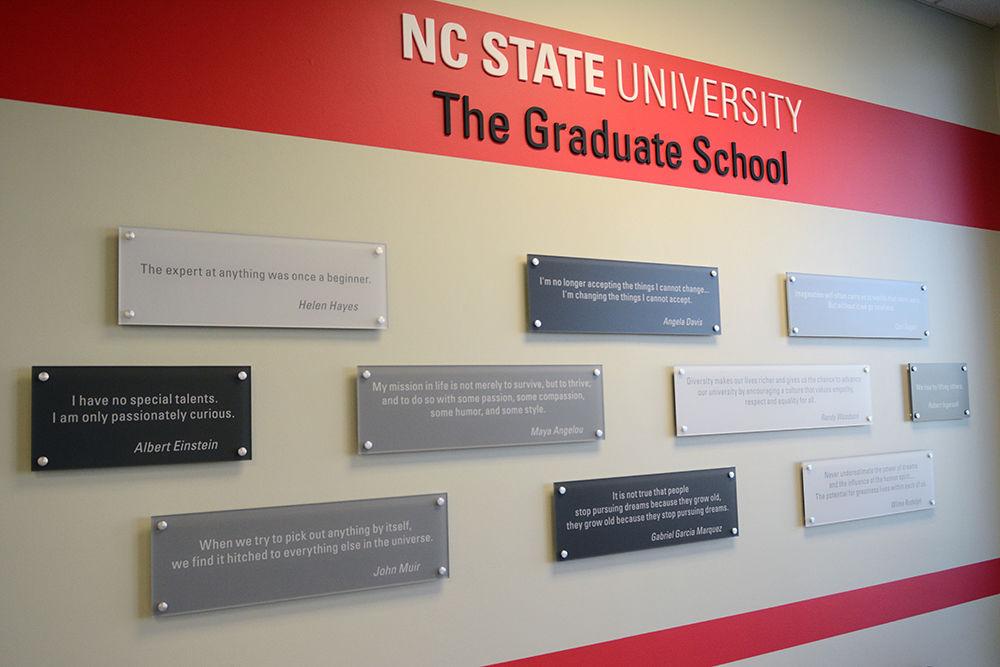
Adarsh Puvvadi Ramamohan Kumar
Walls plaques display famous quotes in the Graduate School Office. The Graduate School Building is located to the right of Wilson College of Textiles in the Centennial Campus. The Graduate School caters to the masters and doctoral students at NC State.
NC State’s Graduate Student Support Plan (GSSP) was developed in 1997 to provide graduate students who work through the university with tuition remission and health insurance. However, it does not universally cover other significant costs graduate students face, such as student fees.
According to Peter Harries, dean of the Graduate School, to be eligible to receive tuition remission and health insurance through the GSSP, graduate students need to be employed as a teaching or research assistant with a minimum annual salary of at least $8,000 and be enrolled full-time.
Harries and members of the Graduate Student Association agreed that the GSSP does not cover all costs faced by graduate students.
“The fundamental piece that isn’t covered is fees,” Harries said. “Some programs have premium tuition that wouldn’t be covered. For instance, [College of Engineering] has an additional enhancement fee, so that wouldn’t be covered either.”
Miles Calzini, second-year Ph. D. student in chemistry, said that the high fees required at UNC System schools make the universities less competitive as graduate school options.
“The main problem is actually not necessarily the stipend pay, because it’s not too bad compared to other North Carolina schools,” Calzini said. “The main issue that I’m aware of is that our fees are significantly higher than most schools. For example, when I applied to other schools in other states, the fees were generally lower and their stipends were higher.”
Calzini said that he personally pays more than 10 percent of his income in fees on top of taxes, but this percentage can be even higher for other departments.
“Fees cannot be covered with state funding, and that’s where most of the funding of the university comes from,” Harries said. “There are lots of conversations that are currently ongoing, that have been ongoing about what we can do to be more competitive on that.”
Calzini said that usage of campus facilities can vary between graduate and undergraduate students and also that the university should consider scaling fees accordingly.
“How much undergrads use it versus grad students is very different,” Calzini said. “So the concept of differential fees where we pay a lower fee than undergrads do is something that’s definitely done at other schools. It’s rare to have grad students and undergrads pay the same fees.”
However, because of the high number of graduate students at NC State and the source of funding that their fees provide, Calzini said he does not think administrators will lower the cost of fees.
Lexie Malico, fourth-year Ph. D. student in chemistry, said that while she is overall satisfied with the health care coverage included in the GSSP, she wishes some form of eye and dental coverage were included.
“I think everyone wishes it had more,” Malico said. “One of the big problems that people run into is getting healthcare off campus, so that can be anything from an emergency room visit to going to see a specialist. Going to see a specialist is incredibly expensive as is, and our insurance doesn’t really cover a tremendous amount in terms of those off campus expenses.”
Summer access to the Student Health Center is an issue that the Graduate Student Association is currently addressing, Calzini said. He hopes this to be resolved within the next few years.
“For the summer, there’s a separate fee to access all summer facilities,” Calzini said. “Graduate students have to pay that because we are considered students, but almost all of us have to stay over the summer to graduate. We shouldn’t be forced to pay to access something that’s supposedly part of our support plan.”
Calzini encourages graduate students to reach out to Student Government with questions and concerns surrounding the Graduate Student Support Plan.
“I know at [UNC-CH] they tried to make an initiative to say they’re going to pay all the student fees, but I believe that it fell through because [there is] no legal way for them to do it,” Calzini said. “Some departments are trying to make it happen, and I’m not sure the mechanism of how they’re going to do that. I do want to give the administration credit. I do think they are sympathetic to it, I’m just not sure that they know what to do exactly, but they need to figure something out.”